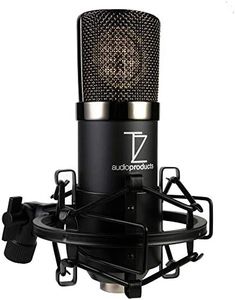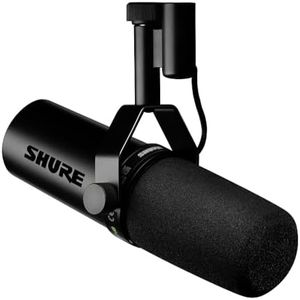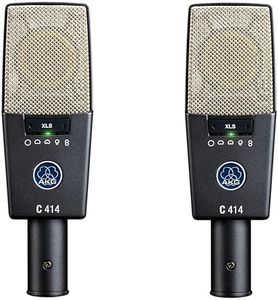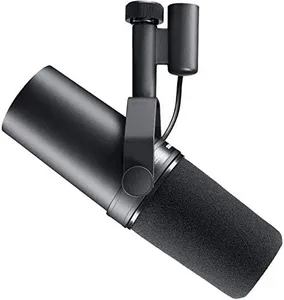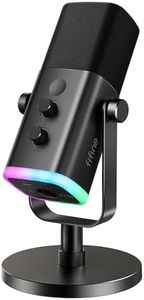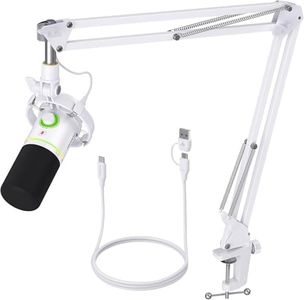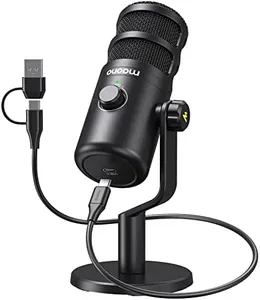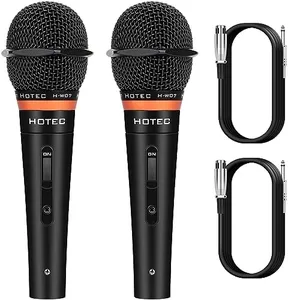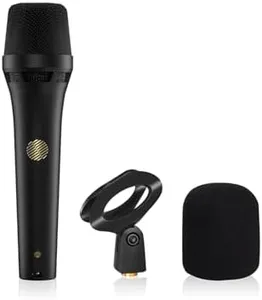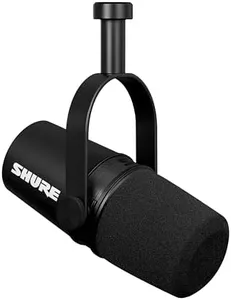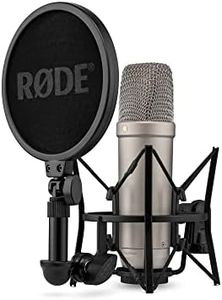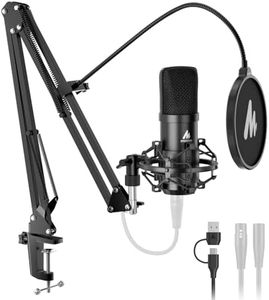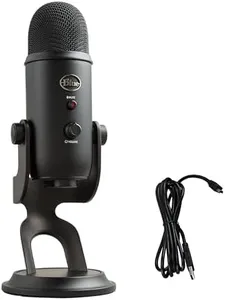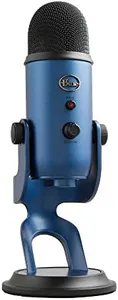10 Best Studio Microphones For Vocals 2026 in the United States
Our technology thoroughly searches through the online shopping world, reviewing hundreds of sites. We then process and analyze this information, updating in real-time to bring you the latest top-rated products. This way, you always get the best and most current options available.

Our Top Picks
Winner
Shure SM7dB Dynamic Vocal Microphone with Built-in Preamp – Studio Mic for Streaming, Podcasting, and Recording – Smooth Sound, Wide Frequency Range, Rugged Build, Windscreen Included, XLR, Black
The Shure SM7dB is a dynamic studio microphone designed especially for vocals, podcasting, and streaming. It stands out because it has a built-in preamp, providing extra clean gain (+18 or +28 dB) without needing additional equipment. This simplifies setup, especially for users seeking good sound quality with fewer devices. The microphone uses a unidirectional (cardioid) polar pattern that effectively isolates the voice from background noise, making it suitable for recording in less-than-ideal environments.
Its wide frequency response ensures the voice sounds smooth and natural, capturing both music and speech with clarity. The built-in shock isolation and pop filter reduce unwanted noises such as breath sounds and handling bumps, delivering polished sound from the start. The rugged build and electromagnetic shielding enhance reliability and resistance to interference. Additionally, the included foam windscreen helps soften plosives.
As a dynamic microphone, it might not capture very subtle vocal details as precisely as some condenser mics. Its size and weight (2.7 pounds) also make it less portable for casual use. The SM7dB is a versatile, professional-quality vocal microphone ideal for users seeking clear, broadcast-ready audio with minimal gear complexity, particularly suited for streamers, podcasters, and vocalists recording in a variety of environments.
AKG Pro Audio C414XLS Pair Studio Grade Professional Large Diaphragm, Dual Capsule, Multi-Pattern, Vocal & Instrument Condenser Microphone with Aluminum Carrying Case. XLR Connector. Gray with Gold.
Most important from
1314 reviews
The AKG Pro Audio C414XLS PAIR is a professional-grade studio microphone known for its versatility and high-quality sound. The matched pair of large diaphragm condenser microphones offers nine selectable polar patterns, making it adaptable for various recording environments and ensuring precise capture of vocals and instruments.
Its frequency response range of 20-20,000 Hz and low self-noise level of 6 dB-A contribute to its capability to deliver clear and detailed audio recordings. The sensitivity of 23 mV/Pa and high max SPL ensure it can handle both delicate and loud sounds without distortion.
Additionally, features like the peak hold LED for monitoring overload peaks and the robust construction make it reliable for both studio and live applications. The inclusion of accessories such as shock mounts, wind screens, and an aluminum carrying case adds to its value, but the microphones' weight and the need for an XLR connection could require more advanced setup knowledge and equipment. This microphone pair is best suited for professional recording artists and sound engineers who need a versatile and high-performing tool for detailed vocal and instrument recording.
Most important from
1314 reviews
Shure SM7B Vocal Dynamic Microphone – XLR Studio Mic for Podcasting, Recording, Broadcasting, Streaming & Gaming – Smooth, Warm Sound, Rugged Build, Detachable Windscreen, Wide Frequency Range, Black
Most important from
12677 reviews
The Shure SM7B is a highly regarded dynamic microphone that fits well into the studio microphone category, especially for vocals. Its unidirectional polar pattern is designed to focus on the sound source in front of it while minimizing background noise, making it an excellent choice for recording, podcasting, and streaming. One of its standout features is the smooth and flat frequency response, which delivers clean and natural sound reproduction, ensuring that vocals come through warm and clear. Many top professionals trust this microphone, highlighting its versatility for various applications, including music production and voiceover work.
The microphone is built with rugged construction, designed to withstand regular use, which adds to its reliability. It also comes with a detachable windscreen that helps reduce plosive sounds and breath noise when close-miking, an essential feature for clear vocal recording.
The SM7B does have some drawbacks to consider. It requires a good amount of gain (at least 60dB) to achieve optimal sound quality, which means you might need a high-quality audio interface or preamp. Additionally, as it's an XLR microphone, it won’t connect directly to computers without an interface, which could be a hurdle for those looking for a more straightforward USB option. Another point to consider is its weight and size, as it might not be as portable as some compact microphones available today, making it less ideal for on-the-go recording. Despite these minor issues, the Shure SM7B remains a top choice for anyone serious about achieving high-quality vocal recordings, whether in a studio setting or for live streaming, thanks to its professional-grade audio performance and robust design.
